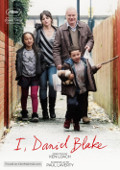
Directed by
Ken Loach
100 minutes
Rated M
Reviewed by
Chris Thompson

I, Daniel Blake
Synopsis: When 59-year-old carpenter, Daniel Blake (Dave Johns) suffers a heart attack on his worksite, he is told by his doctor that he may be off work for some time. Daniel applies for the Employment and Support Allowance but the bureaucratic process deems him fit for work and his only option is to apply for the Job Seekers Allowance while he awaits an appeal. Whilst grappling with the frustrations of the welfare system he meets single mother Katie (Hayley Squires) and her two children, Dylan (Daniel McKiernan) and Daisy (Briana Shann), who, in order to escape a homeless persons' hostel in London, have been forced to accept a flat 300 miles away from home. Daniel befriends the family and they soon become close.
Ken Loach has been telling us working class stories of social justice and social conscience since he made his first film, Poor Cow in 1967 and he’s been working regularly with screenwriter Paul Laverty since they made Carla’s Song in 1996. For their latest film, Laverty undertook a substantial amount of research and conducted interviews in order to create the characters of Daniel and Katie and the effort pays off in his authentic and grounded rendering of these two good people who have fallen on hard times in a country that seems more concerned with adhering to the rules of a complex welfare system than listening to the plight of its citizens.
Johns and Squires, both more familiar to television acting than feature film, give captivating performances laced with a truthfulness that makes their stories all the more compelling. They truly inhabit these roles in a way that makes it hard for an audience not feel like we know and care for them. In a film made up of many strong scenes the one that stays with me is the heartbreaking moment in the foodbank when Katie, wracked with shame and embarrassment, succumbs to hunger in the most demeaning way. It’s shattering.
But this is not an overwhelmingly bleak film. There is humour here as well, not just in the absurdity of the convoluted Catch-22 welfare system, but in the small, touching moments between characters. Yes, their lives are hard and made mores o by the lack of compassion in a system that should be making their lives easier, but there is a dignity and resilience in Daniel that rises above the forces that would push him down. He is an artisan who might sell his furniture to survive, but will not sell the tools of his trade. The moments where we see him practice his craft, carving beautiful fish out of scraps of timber scrounged from his old worksite, and then watching him pass those skills on to Katie’s son Dylan are the moments where we see his pride in what he can do with his hands, even if he doesn’t know how to use a computer to fill out an online form. Daniel is a man with a strong sense of right and wrong, with love and caring for his fellow humans and the surrogate family that he forms with Katie and her children gives him the strength to keep pushing back. As he says at one point, “I’m like a dog with a bone.”
I, Daniel Blake won the Palme d’Or at this year’s Cannes Film Festival and deservedly so. Loach is a fine filmmaker and, at 80 years of age, can still manage to put his finger on the pulse of the injustices in his world to tell us a story in a way that draws us into its heart. As I left the cinema after the screening, I heard a man say, “well that was grim.” He was promptly chastised by his wife who told him she saw it as hopeful and inspirational. They were both right.

Want more about this film?


Want something different?




